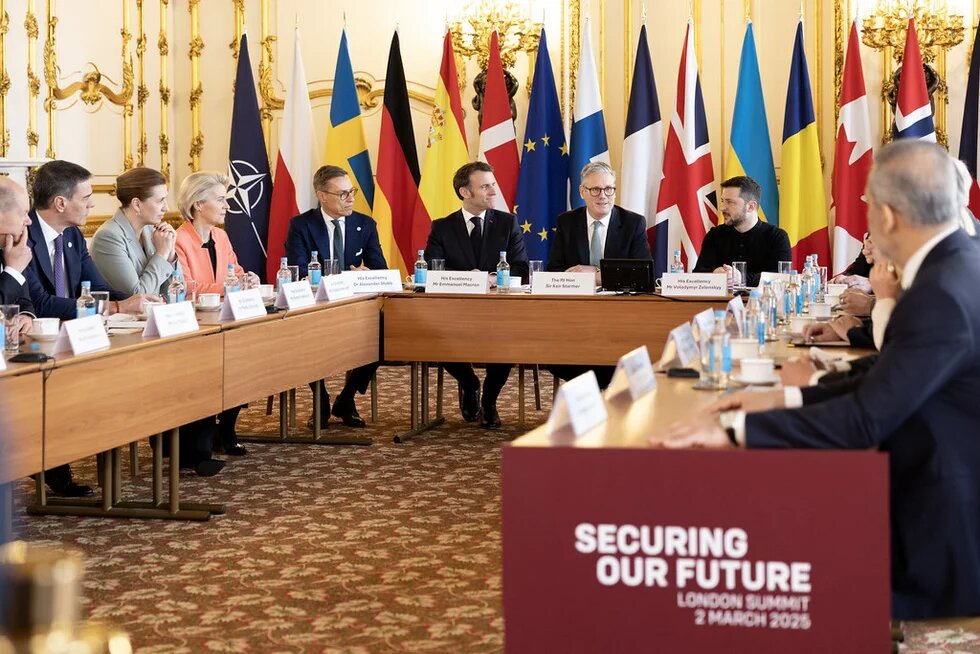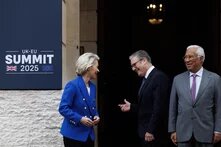Keir Starmer says Britain does not need to choose between the US and the rest of Europe, writes Ros Taylor. But Donald Trump’s behaviour is making the long pivot away from America easier — even if the ‘coalition of the willing’ comes to nothing.

In February, Amazon MGM Studios took control of James Bond, perhaps Britain’s best-known soft power export. In truth the Bond franchise was already in American hands. But the transfer from a family firm to the US tech conglomerate was not greeted positively in Britain.
Nor did Britons enjoy watching Keir Starmer paying obeisance to Donald Trump in the White House. The PM’s diplomacy and ability to avoid upsetting the notoriously volatile president was praised, but the sight of him proffering a state invitation from King Charles was greeted with mild revulsion in many quarters. The King himself made his real feelings clear when he invited President Zelenskyy to his private residence at Sandringham a few days later. When Trump arrives, he will have to be kept far away from anywhere protestors can gather. UK public opinion is generally anti-Trump, with less than half of Britons saying the US is an ally. Seventy percent think France is on Britain’s side.
Losing confidence in America’s leadership of NATO has been a shock for all its members, but particularly for the UK. Britain has long believed it has a ‘special relationship’ with the US, despite increasing evidence to the contrary (Joe Biden preferred Ireland, Barack Obama looked to Germany and France). Our defence relationship with the US is further complicated by Britain’s nuclear deterrent, the four nuclear-armed submarines. Their missiles can be launched without US permission. But parts of them are built and maintained in America. While the submarines will soon be replaced by British-built vessels, the dependency on the US for missile maintenance remains. Intelligence co-operation between the CIA and MI6 is deep and would take many years to unwind.
Starmer’s strategy has therefore been to pivot towards the EU while emphasising the continuing importance of the US relationship. He has repeatedly said that the UK does not have to choose between Europe and America. Starmer’s key role in mustering a ‘coalition of the willing’ to deter further attacks on Ukraine if a ceasefire is a gesture of solidarity with Europe. It also reveals the calculations of a fading superpower in search of a role.
Disillusionment with America is not new
Starmer’s determination to take a leading role in European defence is a marked shift. His predecessor Rishi Sunak offended France by leaving last year’s D-Day commemorations early, and Boris Johnson excluded Britain from structural participation in EU defence in his Brexit deal. It shows that while Britain cannot trade freely with Europe (Starmer publicly endorses Brexit but opposed it for years), it does regard itself as part of the continent and jointly responsible for its security. Timothy Garton-Ash has called this ‘Churchillo-Gaullisme’, drawing on a tradition in which Britain is more invested in NATO than France is.
Co-operating closely with Europe on defence, particularly for a Labour prime minister, is also an opportunity to move on from the mistakes of the post-9/11 world. Britain was a key US ally in the invasion of Afghanistan in 2001 and was one of the four countries that invaded Iraq in 2003. Britain’s willingness to stand by America in the name of defeating terrorism and spreading democracy seems to have been forgotten by people in the Trump administration, and is now widely regretted at home. Tony Blair’s decision to publish a dossier of dubious intelligence claiming Saddam Hussein had weapons of mass destruction was the low point of his premiership. He was mocked as George W Bush’s ‘poodle’.
The experiences of Iraq and Afghanistan made Britain wary of starting and pursuing wars abroad. The chaotic withdrawal from Afghanistan (a ‘disaster’, said the Foreign Affairs Committee) was only four years ago. So when Starmer raised the possibility of ‘boots on the ground’ in Ukraine, he did not convince all of the defence establishment. Ed Arnold, a senior defence fellow at the RUSI think tank who served in Afghanistan, has warned that sending troops to Ukraine does not meet the ‘Chilcot criteria’ for a military operation.
Sir John Chilcot is the author of an extremely thorough inquiry into the 2003 Iraq war. He drew up a checklist of questions which aims to prevent the UK becoming embroiled in another unsuccessful military operation. Questions such as ‘What does success look like?’ and ‘What do we need to deliver?’ have not, Arnold says, been satisfactorily answered. Starmer has since rowed back from talk of UK troops going to Ukraine.
Key uncertainties include France’s ability to stay the course (particularly if the Rassemblement National wins the presidency in 2027), whether Britain can spare the minimum of 5,000 soldiers it would need, and how Vladimir Putin would respond. “He will use the full levers of his military and special services to undermine the operation with an inability for the Europeans to respond in fear of escalation,” warns Arnold. “At its most dangerous, he might choose to deliberately target European forces but insist that such attacks were the result of technical failures or misunderstandings.”
Collaboration with Europe will not be easy
If some defence experts are sceptical about the UK’s ability to help keep a peace in Ukraine, however, they agree about the need for closer defence co-operation with Europe. Luigi Scazzieri, the assistant director of the Centre for European Reform, describes it as ‘shallow’, with very limited co-operation on capability development. “The rules for third country involvement in PESCO [Permanent Structured Co-operation), the European Defence Fund and EDIRPA [procurement] are very complex. While in principle, third countries and third country entities are allowed to participate, in practice the EU’s rules limit their involvement.”
This could be overcome if the UK can negotiate a new security and defence agreement in time for the May summit with the EU. But already the EU, aware of the boost it would give to Britain’s defence industry, has indicated it will not make things easy for the UK. Youth mobility and fish, which both revive Brexit-era worries about sovereignty, are on the table. The UK government would like to think that European defence is too important to become bogged down in second-order spats. But it is almost certainly wrong about that. “The agreement is being held up over fish,” says Scazzieri. “I don't think it will be struck until fish is resolved. A positive scenario is one where both are agreed at the May summit.”
And momentum is already ebbing away from the ‘coalition of the willing’ initiative, as European states focus on defending themselves against future Russian aggression rather than diverting resources to Ukraine. “Starmer has always been clear that the coalition needs two things: a US security guarantee and an agreed ceasefire,” says Scazzieri. “Neither of the two seem likely, least of all Putin agreeing to a deployment of western forces in Ukraine as part of a ceasefire.”
How long can Starmer really continue to position the UK as a bridge between the US and the EU? “In theory Britain can continue not choosing,” says Scazzieri. “In practice there is a risk that the EU or the US get annoyed with it precisely because it is not choosing. So that position could become more uncomfortable over time.”
Britain’s attachment to the ‘special relationship’, like James Bond, will take some time to fade away. But America’s increasingly dismissive attitude towards its allies is making the change easier. Even though the ‘coalition of the willing’ may very well never happen, it has marked the first step on an inevitable trek back towards Europe.
The views and opinions in this article do not necessarily reflect those of the Heinrich-Böll-Stiftung European Union.


